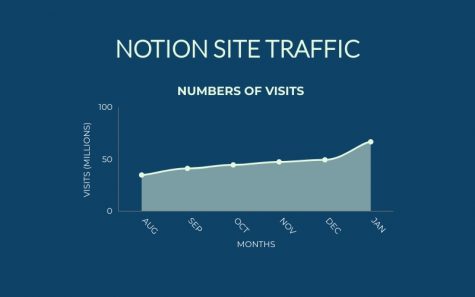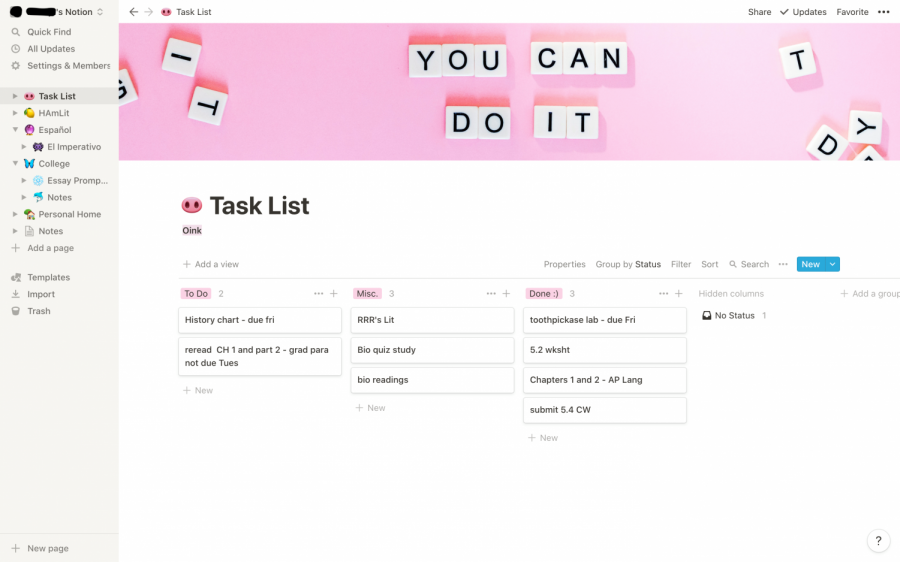A notion to planning
How students use the organizational application Notion to organize their lives
An example of a page that users can create in Notion.
February 12, 2021
After its release in June of 2018, it took two years before Notion became a popular topic for young YouTubers and TikTokers to make videos about. Through these videos, the website’s monthly total visits grew from 35 million in August of 2020 to 67 million in January of 2021. Notion describes itself as an “all-in-one workspace” on its website, and these videos depict it as just that, teaching viewers how to manage every aspect of their lives using aesthetically pleasing to-do lists, spreadsheets and databases.

Although many have begun using Notion during its recent spike in popularity, junior Eeswar Kurli first started using Notion to organize his schoolwork over a year ago after hearing about it on Reddit self-help groups, long before its jump in popularity.
“When I first got into Notion, I looked at it as a glorified to-do list,” Kurli said. “But I think through the year of my using Notion, it definitely was a lot more powerful than I expected it [to be]. I thought it was just going to replace an old to-do list, but it almost became like a second brain, so to speak.”
Kurli states that YouTube tutorials helped him explore the site’s different possibilities and handle its overwhelming nature.
“When I just tried using it by myself it was so scary because I realized how powerful it could be,” Kurli said. “But I didn’t know how to put two and two together. What I did was I just followed the tutorial — I didn’t put any brain into it [and] I just copied what [the YouTuber, Danny Hatcher] said.”
Similarly to Kurli, sophomore Divya Venkataraman also began using Notion before its recent spike in popularity. However, unlike Kurli, who believes that Notion’s best aspect is that it allows users to connect information between different databases, Venkataraman believes that Notion’s to-do list features are most useful to her. One feature that she particularly likes is its prioritization feature, which allows Notion to detect which tasks are most pressing and sort them accordingly, displaying tasks with earlier due dates first regardless of when they were inputted.
Venkataraman is aware of the many other ways people use Notion, such as for note-taking, but she chooses not to use Notion for those purposes because she prefers other more traditional methods, such as pencil-and-paper notes. This is reflected in her belief that people should primarily consider using Notion to compensate in places in their life where they might feel as though their current system does not suit their needs.
Junior Atmaja Patil, who started using Notion recently, agrees with Venkataraman, as she uses Notion to manage the classes that are not easily organized by already existing methods.
“We do have [Google] Drive folders and Schoology stuff set up for a lot of our school classes but there’s a lot of miscellaneous items that don’t fit anywhere,” Patil said. “For example, for my [Honors American Literature] class, we do journal writings and there’s really no place to organize those journals, so I put them all in Notion.”
Patil states that due to Notion’s aesthetically pleasing nature, Notion would be suitable for someone who is motivated by visually pleasing websites.
“There’s some people who are just innately motivated to do task after task or just have a very organized personality,” Patil said. “For me, I need things to look nice to be motivated to stay organized. [Notion would be suitable for] someone who’s more creative on the artistic side, but also wants to help organize all their work together.”
During her time using Notion, Patil has noticed minor technological issues, such as lag in typing speed or Notion’s code detecting certain symbols like slashes or colons to indicate specific features when they are not intended for this purpose. However, she believes that the benefits of using Notion outweigh the inconvenience that the issues bring.
Unlike Patil, Kurli’s complaints about Notion are more broad. He states that Notion’s versatility can be detrimental to users, as it can cause them to ignore Notion’s most fundamental uses. He compares this to how people’s uses for Gmail evolved over time, where some people originally used Gmail like a to-do list although its most fundamental use was for emailing. Because of this, he encourages people who are interested in Notion to not feel daunted by the website’s many features.
“Notion is a lot more friendly than people perceive it to be,” said Kurli. “A lot of people will think Notion is just for the people who are super into self help, or who want to organize their life a lot, but you can use Notion however much you need it, I guess, in a sense, it’s very adaptable to the type of person you are.”


















